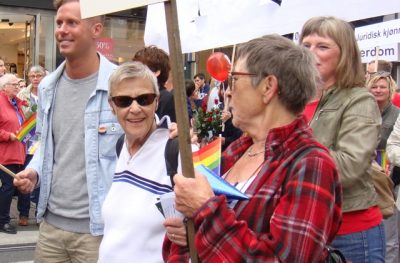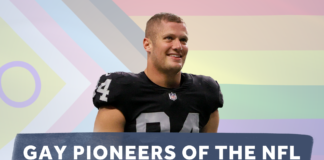Karen-Christine Friele, best known as “Kim,” was being hailed Tuesday morning as the gay rights activist in Norway “who broke the sound barrier” in her life-long battle for equality and social acceptance. “She personally made sure that people like me can live a free life,” said the country’s new Culture Minister Anette Trettebergstuen, a lesbian herself.

Kim Friele, center in white top, marching with her late longtime partner Wenche Lowzow in Oslo’s Pride Parade in 2014. She also took part in Pride events until as late as 2019. Lowzow died in 2016. PHOTO: newsinenglish.no/Nina Berglund
Friele had been in poor health in recent years, but marched as late as 2014 in what’s become an annual tradition in Oslo, the country’s largest Pride Parade. She could share much of the credit for how the parade, with its official recognition and celebration of gender diversity, has replaced discrimination and criminal persecution, just in the past few decades
Friele, who was 86, was originally from Bergen, and one of the very first to openly identify herself as a lesbian in Norway. She served as secretary general of Det Norske Forbund av 1948, an organization that worked actively to remove paragraph 213 in the law forbidding homosexuality, finally succeeding with its removal in 1972. Fiele was widely viewed as a brave and important force in finally getting Norwegian politicians to overturn the long-standing law that criminalized homosexuality, but it took a few more decades before homosexuality won the tolerance and general social acceptance it now has in Norway.
“She was the right person at the right time,” Tone Hellesund, a professor at the University of Bergen and friend of Friele, told state broadcaster NRK, which topped its newscasts Tuesday with Friele’s death. “When she threw herself into the homo-battle from the middle of the 1960s, it was her self-confidence and lack of fear of the authorities that counted the most.”
Friele also campaigned for recognition of homosexuals in the state church at the time. She followed international developments closely and directed attention at what other countries were doing as gay rights movement grew.
“In recent years, her main campaign was to make sure we remember the history, and make sure that rights achieved be respected and taken care of, so that we don’t lose them again,” said Hellesund, who was among those taking the initiative to establish an archive of Norway’s gay rights movement at the University of Bergen.
Trettebergstuen stressed how much Friele meant to the fight for equal rights: “Without her, Norway wouldn’t have the equality it does. Without her I wouldn’t have been able to be myself. She took on the fight for gay rights at a time whe it was illegal, and that cost her a lot. She was also a close friend, so this is a very sad day.”
Prime Minister Jonas Gahr Støre called Friele “a pillar” in the fight for equal rights. “We will continue the fight so that more people can be who they are and love those they will, in Norway and the world.”
Friele was both an activist and an author and won many prizes over the years, including the Fritt Ord Pris (Free Word) Prize in 1978, for how she championed freedom of expression and information. She was knighted by King Harald (1st Class, St Olav’s Order) and has been an honorary member of the Labour Party since 2008.
She and her long-time partner Wenche Lowzow were also the first two women to be married under Norway’s new partnership law in 1993. Lowzow died in 2016.
newsinenglish.no/Nina Berglund







